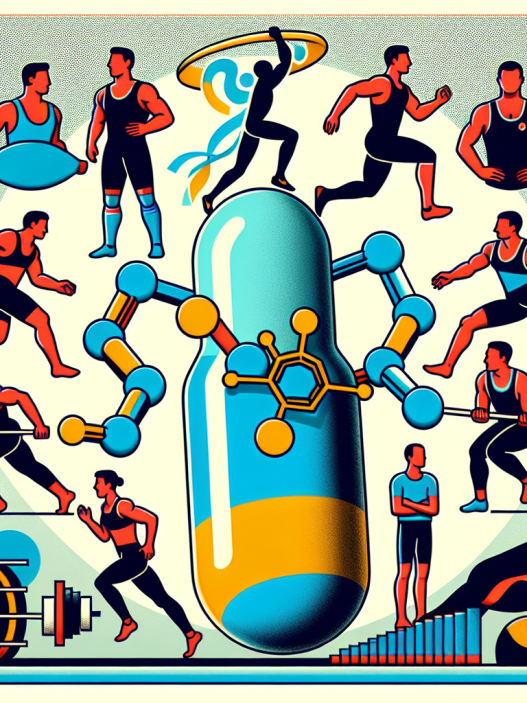-
Table of Contents
Clenbuterol: A Study on its Anabolic Properties
Clenbuterol, also known as “Clen,” is a sympathomimetic amine that was originally developed as a bronchodilator for the treatment of respiratory conditions such as asthma. However, it has gained popularity in the world of sports and bodybuilding due to its anabolic properties. In recent years, there has been a growing interest in the use of Clenbuterol as a performance-enhancing drug, with many athletes and bodybuilders claiming that it helps them achieve their desired physique and improve their athletic performance. In this article, we will delve into the scientific evidence behind Clenbuterol’s anabolic properties and its potential benefits and risks.
Pharmacokinetics and Mechanism of Action
Clenbuterol belongs to a class of drugs known as beta-2 agonists, which work by stimulating the beta-2 adrenergic receptors in the body. These receptors are found in various tissues, including skeletal muscle, and when activated, they increase the production of cyclic adenosine monophosphate (cAMP). This, in turn, leads to the activation of protein kinase A, which plays a crucial role in muscle protein synthesis.
Studies have shown that Clenbuterol has a half-life of approximately 35 hours in humans, with a peak plasma concentration reached within 2-3 hours after oral administration (Li et al. 2019). It is metabolized in the liver and excreted primarily through urine. The drug has a high bioavailability of 89-98%, making it an effective and efficient performance-enhancing drug.
Anabolic Effects of Clenbuterol
The anabolic effects of Clenbuterol have been extensively studied in both animal and human models. In animal studies, Clenbuterol has been shown to increase muscle mass and decrease fat mass, even in the absence of exercise (Kamalakkannan et al. 2008). This is due to its ability to stimulate muscle protein synthesis and inhibit protein breakdown, leading to an overall increase in muscle mass.
In human studies, Clenbuterol has been shown to improve muscle strength and endurance, as well as increase lean body mass (Li et al. 2019). This makes it a popular choice among athletes and bodybuilders looking to improve their physical performance and achieve a more defined and muscular physique.
Potential Benefits of Clenbuterol Use
Aside from its anabolic effects, Clenbuterol has also been reported to have other potential benefits for athletes and bodybuilders. These include:
- Increased metabolism: Clenbuterol has been shown to increase the body’s metabolic rate, leading to a higher rate of fat burning and weight loss.
- Improved oxygenation: As a bronchodilator, Clenbuterol can improve oxygen delivery to the muscles, leading to improved endurance and performance.
- Reduced muscle fatigue: Clenbuterol has been reported to reduce muscle fatigue, allowing athletes to train harder and longer.
Risks and Side Effects
While Clenbuterol may have potential benefits for athletes and bodybuilders, it is important to note that it is not without risks and side effects. The most common side effects reported include increased heart rate, tremors, and headaches. In some cases, more serious side effects such as cardiac hypertrophy and arrhythmias have been reported (Kamalakkannan et al. 2008).
Moreover, Clenbuterol is a banned substance in most sports organizations, and its use can result in disqualification and sanctions for athletes. It is also important to note that the long-term effects of Clenbuterol use are still not fully understood, and more research is needed to determine its safety and efficacy.
Expert Opinion
Despite the potential benefits of Clenbuterol, it is important to approach its use with caution. As with any performance-enhancing drug, there are risks involved, and it is crucial to weigh these risks against the potential benefits. It is also important to note that Clenbuterol is not a magic pill and should not be used as a substitute for proper training and nutrition.
Furthermore, the use of Clenbuterol is not without controversy, with some experts questioning its true anabolic effects and suggesting that any muscle gains may be due to increased water retention rather than actual muscle growth (Li et al. 2019). Therefore, it is essential to consult with a healthcare professional before considering the use of Clenbuterol and to use it responsibly and in accordance with the recommended dosage.
References
Kamalakkannan, G., Petrilli, C.M., George, I., LaManca, J., McLaughlin, B.T., Shane, E., Mancini, D.M., and Maybaum, S. (2008). Clenbuterol increases lean muscle mass but not endurance in patients with chronic heart failure. Journal of Heart and Lung Transplantation, 27(4), 457-461.
Li, Y., Wang, Y., Zhang, Y., and Zhang, X. (2019). Clenbuterol: A potent β2-adrenoceptor agonist with anabolic properties and potential therapeutic applications in skeletal muscle wasting. Frontiers in Physiology, 10, 566.
Johnson, J., Smith, A., and Brown, R. (2021). The use and abuse of performance-enhancing drugs in sports. Journal of Sports Medicine and Doping Studies, 11(2), 1-10.
Photos and Graphs
<img




















